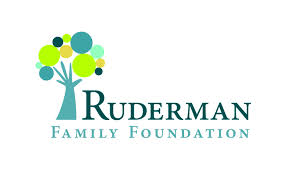 We conclude our series with this post from Elizabeth Zwick, Senior Program Officer at the Ruderman Family Foundation. Elizabeth tells the story of how her foundation first developed its commitment to disability inclusion and went on to become one of the leading funders in the field. We conclude our series with this post from Elizabeth Zwick, Senior Program Officer at the Ruderman Family Foundation. Elizabeth tells the story of how her foundation first developed its commitment to disability inclusion and went on to become one of the leading funders in the field. |
This year, we celebrate the 25th anniversary of the Americans with Disabilities Act (ADA). With the ADA, our nation committed itself to eliminating discrimination against people with disabilities.In line with our work to advance diversity, equity, and inclusion for all people, the ADA represents a commitment to ensuring opportunity and access for people with disabilities. In philanthropy, we have the opportunity to ensure that people with disabilities are represented both in the decision-making process and the outcomes of our work.As we mark the anniversary of the ADA in July, we will be showcasing stories that highlight the work being done in philanthropy to ensure diversity, equity, and inclusion for all. |
I am the Senior Program Officer at a family foundation whose mission centers on promoting the full inclusion of people with disabilities; as such I am privileged to work at the intersection of family values and social justice. I want to share the story of how one family foundation arrived at that mission and how we continue promoting disability rights through ever more creative means.
First I’ll explain how the Ruderman Family Foundation came to funding disability inclusion by way of their Judaism-inspired value of social justice.
The Rudermans followed the philanthropic start-up pattern of many family foundations. Founder and successful businessman, Morton E. Ruderman, had long been in the habit of giving back to his local Jewish community in Boston. Initially he donated funds and business expertise to a variety of Jewish causes, eventually becoming involved with the local Jewish giving federation, Combined Jewish Philanthropies (CJP).
According to family lore, one day Mort came to his family and said, “I just committed to making a $10 million gift to CJP for private Jewish schools in Greater Boston.” He turned to his daughter Sharon Shapiro and daughter-in-law Shira Ruderman and said, “I want you two to figure out how to structure this donation.” They began talks with CJP to identify a specific focus area of focus where the gift could have real impact.
As Sharon, Shira, and Mort learned more about these schools they became increasingly troubled by the near-total absence of children with disabilities in their classrooms. (In fact these schools accurately reflected the historically common practice of excluding children with disabilities from all kinds of institutions– not only Jewish institutions, but also mainstream institutions in the U.S. and around the world.) As an insightful and compassionate mensch, Mort recognized this systematic exclusion as deeply unfair, an affront to his moral values and those of Judaism.
The story is that Mort said to his family, “we in the Jewish community are good at taking care of our elder members. But now I see that we are poor at taking care of our members with disabilities. I want our family to change that.” As a businessman he wisely valued the expertise of others; he knew he was not an expert in philanthropy, and sought out the advice of experts to assist his family on its philanthropic journey.
At this time the Ruderman family understood their growing commitment to serve children (and later, adults) with disabilities exclusively as a social justice imperative, and agreed it would become the major focus of their giving.
Soon after, three major events deepened the family’s commitment to disability issues. First, Mort Ruderman was diagnosed with a fatal genetic condition and the whole family witnessed his acquisition of a medically-based disability. Second, as Mort’s health began to decline, Jay Ruderman was named President of the Foundation. And third, a baby boy with autism was born to Jay’s brother Todd, bringing previously abstract social justice concern about disability issues into the very heart of family life.
Jay Ruderman was trained in law and public policy and brought a strong political sensibility to his leadership of the Foundation. He hired Jo Ann Simons, a prominent leader in the Massachusetts disability rights community, as disability consultant to the Foundation. Jo Ann offered Jay an historical perspective on the issue of greatest importance to the developmental disability community: inclusion in all aspects of community life.
Jay’s familiarity with civil rights issues allowed him to immediately understand the disability community as a socially, economically, and politically excluded and segregated class. This is the assumption from which he leads and this is the fundamental perspective we hold today: disability rights are civil rights.
Today, several family members are active in the operations of the Foundation on a daily basis, which we understand to be a bit unusual. Jay’s sister Sharon Shapiro oversees a comprehensive web of resources and supports for all children and adults with disabilities throughout the Boston Jewish community. Jay’s Israeli-born wife Shira has taken the reins of the family’s extensive philanthropic programs in Israel.
The Ruderman Family Foundation currently pursues three approaches to promoting disability inclusion. First, we fund a few select programs in Israel and the U.S. that we believe will increase levels of community inclusion. In these programs we concern ourselves equally with the experiences of participants with and without disabilities; we believe our movement desperately needs to reach outside the community of those who already understand and value inclusion to appeal to the public at large.
Our second approach involves producing some of our own initiatives, including special events and philanthropic prizes.
It is Jay’s belief that we will exercise leadership in the sector more effectively by pursuing a hybrid philanthropic model combining characteristics of both grant making and operating foundations.
Our third approach is to serve as a champion of disability inclusion through active use of media, especially social media. We publicize all of our programs broadly, knowing that we cannot fund all the inclusion efforts needed everywhere but believing that we can use our resources to implore and inspire others to take responsibility for inclusion in their own institutions and communities. As part of this approach, the Foundation employs several communications consultants, enjoys an active social media profile, and places articles and op-eds in all kinds of media outlets on a regular basis. As a result, the Ruderman “brand” is publicly linked to the message of disability inclusion.
Jay reports that he believes the Foundation’s activities have had a positive impact on his family overall, but having such a public presence was not comfortable for the family in the beginning. There is a cost to family members of being so publicly exposed, with their last name routinely appearing in Jewish media around the world. Many people don’t separate the family members from the Foundation and take funding declinations personally. Sharon reports that having a clear area of focus makes it easier for her to decline unrelated funding requests from members of her local community, even those she may have known for many years.
In 2013, the Foundation established a Prize in Mort’s honor: the Morton E. Ruderman Award, a $100,000 award to an individual who has made an extraordinary contribution to the inclusion of people with disabilities in the Jewish world and the greater society. This provides a formal recognition of the impact of the Ruderman patriarch on the philanthropic work he launched.
In my work I often meet people who knew Mort well. They often ask, “Did you know him?” and when they learn that I did not, they inevitably launch into some kind of story about this quiet mensch: how he helped save their business, how he helped save their job, how he helped save their synagogue, how he helped educate their child, how always he went out of his way to help anyone he could, how he was one of the most remarkable men they had ever known. He was not my father and I am not Jewish, but as a disability rights activist I believe we are fortunate that this modest man turned his economic success into an opportunity to work for social justice and inspired his family to so passionately carry out his vision of fairness for all.
Tags: ADA25, disability, Ruderman Family Foundation